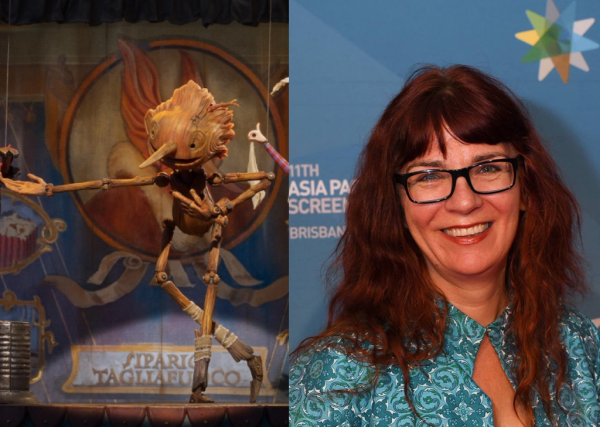Alum Melanie Coombs talks Oscars, Animation, Pinocchio & UTS
“The seductive thing to me about film as a medium was that it can change people’s minds because they own the emotional journey.
It’s an empathetic experience.”
Melanie Coombs
Melanie Coombs is a UTS Media Arts Production alum, a world-renowned Academy Award-winning creative producer, and a champion for the power of film - especially animation.
Melanie co-produced Guillermo del Toro’s version of Pinocchio with the team from ShadowMachine, the world's leading stop-motion animation studio in Oregon.
Del Toro's Pinocchio had already won multiple significant awards when in March the film was awarded Best Animated Feature at the 2023 Oscars.
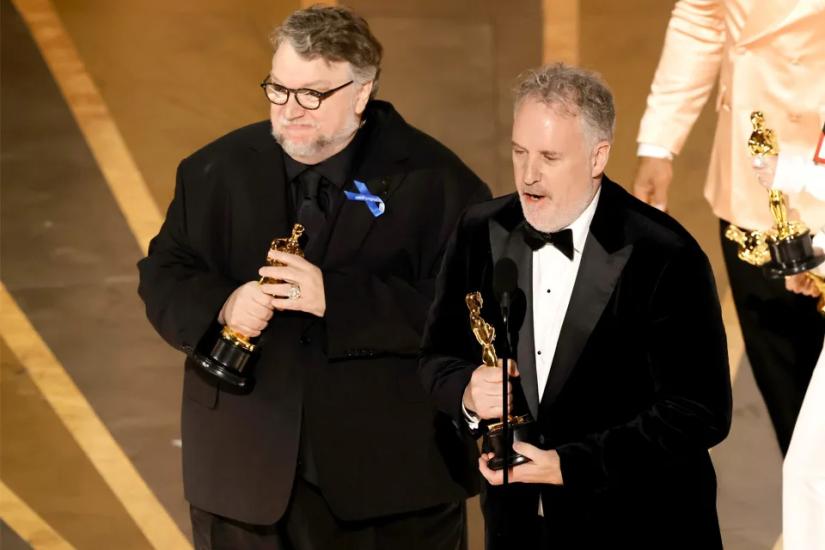
In the Del Toro and ShadowMachine version of Pinocchio, available on Netflix, the story of the wooden puppet who wishes to be a real boy is set it in 1930s Italy, during the rise of Mussolini.
In his acceptance speech, Guillermo del Toro said:
Animation is cinema. Animation is not a genre... and animation is ready to be taken to the next step. Keep animation in the conversation.”
Del Toro's films are cinematic feasts of storytelling for mature audiences, often with CGI and animatronic elements of horror and fantasy, and explorations of dark themes such as fascism and questions around morality and religion, and the celebration of innocence in a harsh world.
His comments at the Oscars highlight the struggle animation faces to be regarded not only as a medium for storytelling for adults, but also to be genuinely recognised for its artistic expression and technical innovation.
This is Melanie's second Academy Award for producing an animated film for adult audiences.
She produced Oscar-winning short Harvie Krumpet, written and directed by Adam Elliott, about an optimistic boy (Harvek Krumpetzki) born in Poland in 1922 who "despite being mercilessly teased, is encouraged by his mother who assists him in collecting wonderful ‘fakts’ about the world. One night Harvek’s life is irrevocably altered when WWII breaks out and he migrates to Australia. In an attempt to assimilate Harvek changes his name to Harvie Krumpet and, in the suburb of Spotswood, begins a new life involving marriage, parenthood and finally, old age."
She collaborated with Adam Elliott again and produced Mary and Max, a feature-length bittersweet "tale of the friendship between two unlikely pen pals: Mary (Toni Collette), a lonely, eight-year-old girl living in the suburbs of Melbourne, and Max (Philip Seymour Hoffman), a forty-four-year old, severely obese New York Jewish atheist with Asberger's Syndrome." The late, great Barry Humphries narrates.

see YouTube closed captions
Harvie Krumpet (2003) Produced by Melanie Coombs, Written and Directed by Adam Elliott. Winner of the 2004 Oscar for Best Animated Short Film. On YouTube.
Mary and Max (2009) Produced by Melanie Coombs, Written and Directed by Adam Elliott. Winner of the Annecy Grand Cristal Award and Asia Pacific Screen Award. On Stan.
At the 2023 Hollywood Critics Association Awards Melanie commented that animators love to tell children's stories "but that's not the only thing we can do".
Her own extensive multi-faceted filmmaking background includes dramatic live action feature films and documentaries, as well as award-winning animation and she says;
"Animation should be considered with the same regard for adult storytelling as live action films and documentary, and with the same recognition for excellence for all filmmaking elements, such as cinematography, sound design, costuming, editing and so on".
The place of animation in cinema
Animation dates back to earliest days of cinema, and its early popularity was heavily reliant on the success of Disney, with 1928’s Steamboat Willie and 1937’s Snow White and the Seven Dwarves cementing the ‘house of mouse’ as a powerhouse of the form to this day.
The original Disney 1940 version of Pinocchio was the first animated feature to win Oscars for it's score and original song "When You Wish Upon A Star".
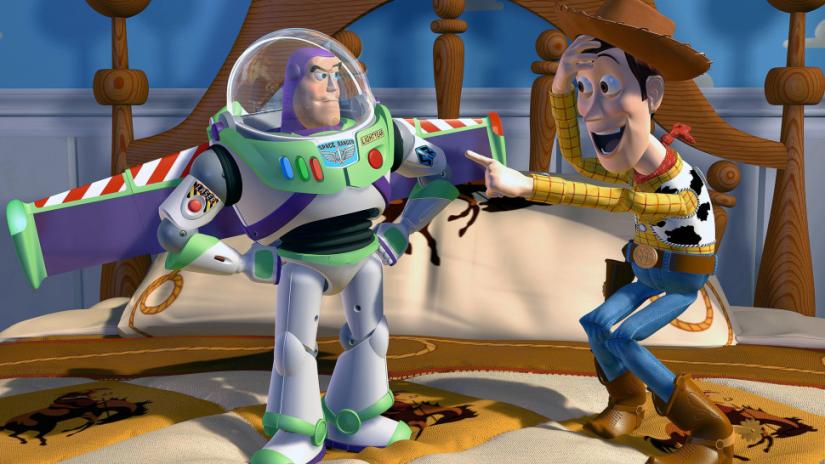
Photo credit: Disney Pixar.
However, only three animated films have been nominated for the Academy Award's coveted Best Picture award: Beauty and the Beast (1991), Up (2009), and Toy Story 3 (2010).
Two were nominated for Best International Feature, Waltz With Bashir (2008) and Flee (2021). The creation of the Best Animated Feature for the 2002 awards (won by Shrek), highlighted the growing appreciation for the form.
Animated films targeted at adults demonstrate the abilities of the form to grapple with serious concerns and tell complex, emotional stories.
Recent examples such as beautifully crafted animated films such as Persepolis (2007), Anomalisa (2015), Waltz with Bashir, and Melanie Coombs' own Harvie Krumpet (2003) and Mary and Max (2009) all drew significant critical acclaim from adult audiences.
Other filmmakers with backgrounds in live action have also turned to animation to expand the storytelling experience for adult audiences.
Well known examples include Wes Anderson for Isle of Dogs and in a brilliant sequence in The French Dispatch, and Richard Linklater, whose films Waking Life (2001) and A Scanner Darkly (2006) used an experimental form of rotoscoping (an animation technique where the film is firstly shot and then drawn over).
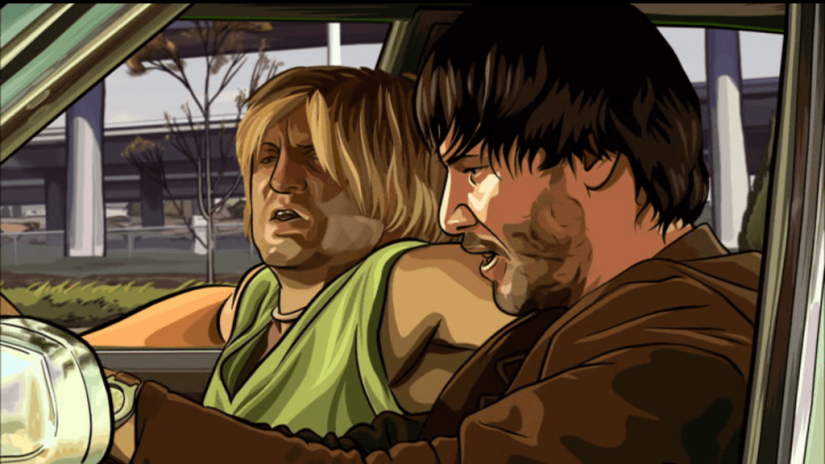
An example of the rotoscoping style in 'A Scanner Darkly'. Credit: Warner Independent Pictures.
Del Toro’s Pinocchio reinterprets the classic children's story made famous by Disney as an existential meditation on mortality, moral agency, and obedience, set against the rise of Fascism in World War II era Italy.
Melanie's beginnings
Melanie didn’t start out seeking a career in animation, or even film. She first enrolled at UTS in “what feels like a million years ago…the late eighties” to study a Bachelor of Arts in Communications, majoring in Radio. She volunteered at 2SER, ultimately becoming station coordinator.
Eventually, Melanie chose not to pursue the broadcast path any further, as she, by her own admission “wasn’t great at talking into a vacuum, which is what great radio needs right?”
Melanie enrolled in some film subjects, a pivot which opened her up to “see the power of film as a medium not just to tell people things, but to show people things.”
This shift sent Melanie on a journey that has seen her produce a range of acclaimed projects, to work with the some of the world’s most renowned creatives, travel the globe, and carve out a career as one of the eminent producers of stop-motion animation in the industry today.
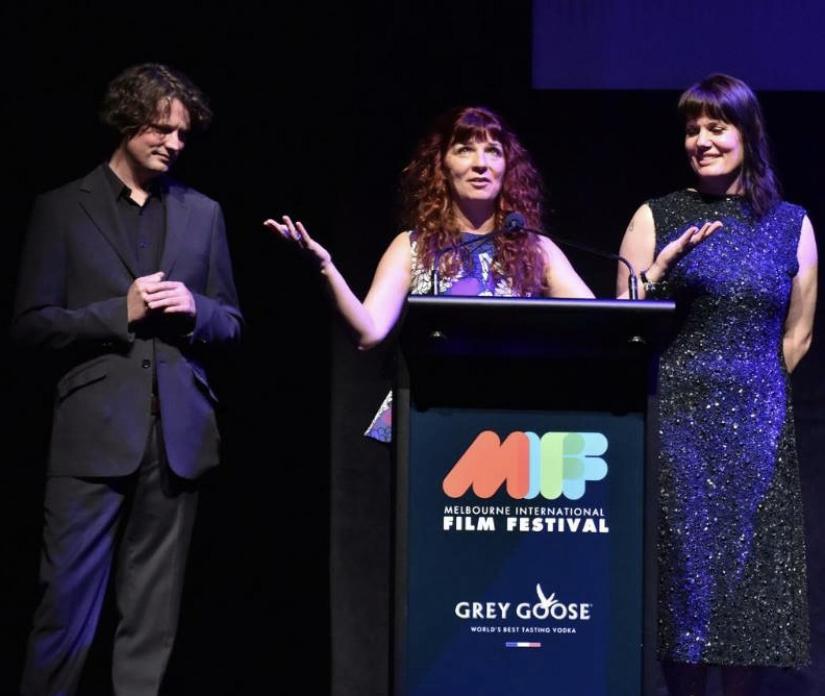
Melanie on stage, with Cris Jones and Alicia Brown, to present 'The Death and Life of Otto Bloom' at the Opening Night of the 2016 Melbourne International Film Festival. Photo credit: Optimism Films.
“The seductive thing to me about film as a medium was that it can change people’s minds because they own the emotional journey, it’s an empathetic experience,” says Melanie.
This is true in a range of her works, not just from her recent award-winning work on Guillermo del Toro’s Pinocchio, but from her collaborations with Australian director Adam Elliott on Harvie Krumpet and Mary and Max, and her other work in live action and documentary.
On many productions, Melanie identifies herself as a ‘creative producer’, which she describes as "the person who is approached by a writer or director, embraces the idea, and then starts the work to make it happen."
This can mean finding potential collaborators, identifying strengths and weaknesses, keeping an eye on the market, setting a realistic budget, and constantly generating enthusiasm and excitement for the film, “making the project undeniable, willing it into being.”
It is a diverse, broad role that requires a range of skills. Melanie says she began this practice at UTS, where theory and practice were taught side-by-side.
I was reading up about the history of cinema and theoretical ideas of feminism, structuralism, etc, and learning all that cool stuff, alongside actually making things.
By doing both at the same time, it grounded the practical in a place of principles and ideas, and that foundation is something I’ve always carried with me. Everything I do is founded on principles.
After completing her degree, Melanie moved to Melbourne, taking a job working for the Melbourne Film Office and joining the local Women in Film group. Here, Melanie put to work the skills and theories she’d begun at university, and balancing creativity with the business side of the craft.
This move also revealed to Melanie the key differences in attitudes towards film between the two cities, as she found a much clearer embrace of artistic expression in Melbourne that she felt was not present in Sydney.
Melanie would return to Sydney however, enrolling in a producing course at AFTRS to learn more of the “nuts and bolts” skills she needed to further her career, such as managing budgets and productions.
A sense of “Australian egalitarianism”
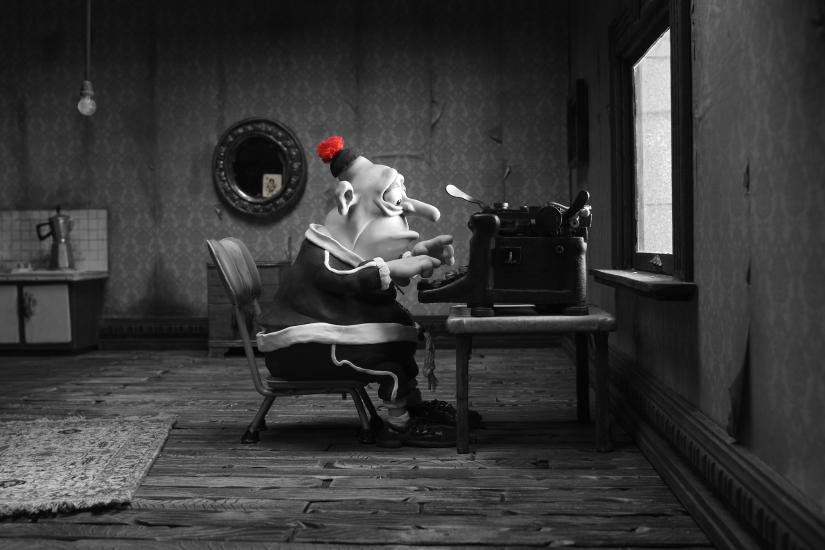
A still from 'Mary and Max'. Photo credit: Melodrama Pictures.
After producing the feature length follow-up to Harvie Krumpet with 2009’s Mary and Max, Melanie was at something of an impasse. She describes this as “the dramatic 40-year-old thing, everything falling apart.”
This was in-part due to the relative commercial failure of the film, which received critical acclaim yet only managed to return a quarter of it’s $8.2 million budget. Melanie attributes this somewhat to the global financial crisis, and the fact that audiences didn’t yet want to see an adult-animated feature film with such dark themes.
This time saw Melanie experience a “crisis of confidence”, which led to her taking up an opportunity to move to the UK and set up a production company called Optimism Films “which tragically was not as successful as the name would suggest.”
Ultimately, this path did lead Melanie to the “the home of stop-motion animation” Portland, Oregon, taking up a position at stop-motion powerhouse ShadowMachine, where she now works and lives with her husband.
As she’s now spent the better part of a decade working overseas, Melanie laments that while she’s “no longer an Australian storyteller” she still attempts to bring a sense of ‘Australian egalitarianism’ to her work.
She however understands the difficulty she would face doing the same work in Australia, and the hardships of film funding and distribution in Australia are well-known to her.
This is disappointing she notes, given that Australians have such unique stories to tell, and ‘Australianness’ on screen, as Sandy George writes, is responsible for many of the best cultural touchstones of our nation, such as Mad Max, Muriel’s Wedding, and Priscilla, Queen of the Desert. These films were all decidedly and uniquely Australian.
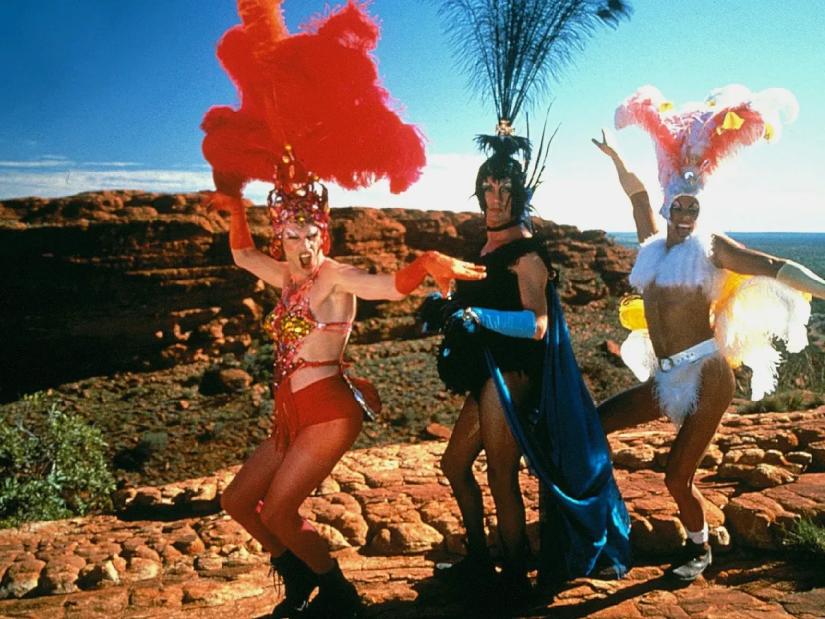
'Priscilla, Queen of the Desert' (1994). Photo credit: Roadshow Entertainment.
Melanie comments that the desire for Australian filmmakers to do away with their ‘Australianness’ in order to find commercial success overseas is damaging and unfounded.
She observes,
There’s this idea that if we just make elevated genre films that they’re going to slot in, and I just don’t think it’s true.
I think that finding ways to identify and celebrate the specificity of Australian cultural identities is through unique stories, coming from the individual point of view of Australians - I think that’s the way we should be going.
Melanie notes this with the caveat that she hasn’t worked in Australia in years, so she is "not an expert" in the current Australian film landscape.
However, she feels a unique cultural insecurity in the Australian market that is not present in either the British or American industries, and it has to be addressed.
Making yourself undeniable
Melanie dedicates time to improving opportunities for filmmakers and creatives to forge a path into the industry. A recent example; for Pinocchio she collaborated with Screen Australia to bring in two Australian creatives to work on the film.
She is also an Ambassador for Screenrights, a member of Women in Animation, Women in Film, and is a member of the Animation Branch of the Academy of Motion Picture Arts & Sciences, and ASIFA.
Ultimately though, Melanie believes that it is the job of the filmmaker to seek out the path to tell their own stories.
It’s clear that Melanie’s own career has been forged not only by her skill, but in her ability to create opportunities for herself. She sees this as one of the best skills for filmmakers and animators to possess.
Animation is truly international - do what you can to get some international experience. Those kinds of opportunities exist, and if they don’t exist, make them for yourself right?
Work out where you want to go, and approach Screen Australia or Vic Screen or any of the funding agencies, and say to them ‘I want to do an internship with this company. I’ve contacted them, if you can support me with a travel grant and some money, they’ll have me.’
So just go out and grab it. Make yourself undeniable.
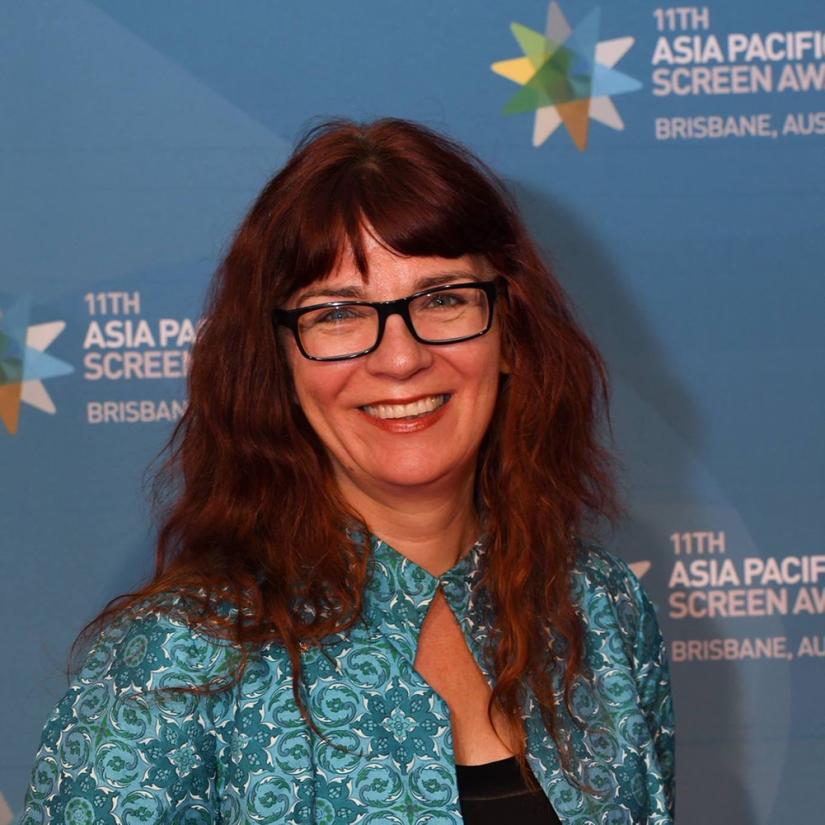
Photo credit: Screen Australia.
